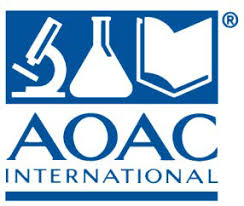How accurately and appropriately are foods and their ingredients represented to the consumer? Join AOAC experts to learn about food authenticity analytical science in a webcast in collaboration with Food Analysis and Separation Science.
 The speakers at this webinar will highlight the complexities for stakeholders in the supply chain and for government regulators when food fraud testing is required. Such complexities include defining authenticity for any commodity of interest, detecting the presence and identity of an adulterant and the benefits of an integrated approach that incorporates both non-targeted (NTT) and targeted (TT) testing.
The speakers at this webinar will highlight the complexities for stakeholders in the supply chain and for government regulators when food fraud testing is required. Such complexities include defining authenticity for any commodity of interest, detecting the presence and identity of an adulterant and the benefits of an integrated approach that incorporates both non-targeted (NTT) and targeted (TT) testing.
Attendees will be introduced to the approach taken by AOAC International's Food Authenticity Methods (FAM) Program and to the TT and NTT consensus performance standards recently adopted for methods to authenticate high priority commodities such as olive oil, honey and milk.
This webinar will include a series of presentations from key experts in the field, including:
 Food authenticity, EMA, and the analytical challenges facing industry, regulators, and consumers Bert Pöpping (FOCOS, Germany)
Food authenticity, EMA, and the analytical challenges facing industry, regulators, and consumers Bert Pöpping (FOCOS, Germany)
Targeted test applications: assessing gaps in curren t capabilities and bridging non-targeted and targeted testing approaches Joe Boison (AOAC International)
t capabilities and bridging non-targeted and targeted testing approaches Joe Boison (AOAC International)
 Non-targeted testing approaches, challenges, and successes John Szpylka (AOAC International)
Non-targeted testing approaches, challenges, and successes John Szpylka (AOAC International)
 Strategic approach of the AOAC INTERNATIONAL Food Authenticity Methods Program for 2020 Palmer Orlandi (AOAC International)
Strategic approach of the AOAC INTERNATIONAL Food Authenticity Methods Program for 2020 Palmer Orlandi (AOAC International)
Economically motivated adulteration (EMA) encompasses a wide range of deliberate acts designed to misrepresent the authenticity and value of a food product for economic gain. This includes the fraudulent addition of non-authentic substances, or the removal or replacement of authentic substances without the purchaser’s knowledge for the economic gain of the seller.
This webinar will describe the impact of EMA and the continued need for analytical vigilance to combat fraud through defined Standard Method Performance Requirements (SMPRs®) and internationally recognized Official Methods of AnalysisSM.
Food authenticity experts will highlight the complexities for stakeholders in the supply chain and for government regulators when food fraud testing is required. These include defining authenticity for any commodity of interest, detecting the presence and identity of an adulterant, and employing an integrated approach that incorporates both non-targeted and targeted testing.
Attendees will be introduced to the approach taken by AOAC INTERNATIONAL’s Food Authenticity Methods Program and to the targeted and nontargeted consensus performance standards recently adopted for methods to authenticate high priority commodities such as olive oil, honey and milk.
Lastly, attendees will be introduced to the program’s strategic goals for 2020 that include an expansion of commodity-specific analytical standards for authenticity, guidance on reference materials and the incorporation of standards for molecular and genomic applications to complement chemical and spectroscopic methods currently under consideration to support authenticity claims and combat fraud.





